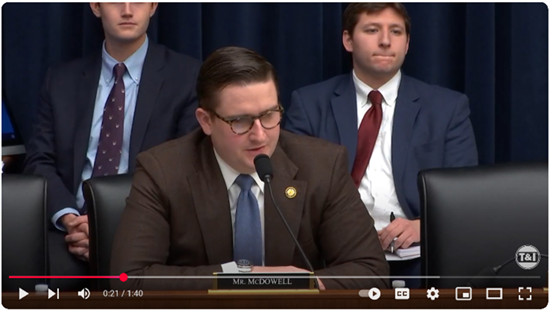Press Releases
Hearings Focuses on Improving America’s Maritime Infrastructure, Shipbuilding, and CompetitivenessWashington, DC – The Coast Guard and Maritime Transportation Subcommittee today held its first hearing of the Congress today focused on how to improve the nation’s maritime infrastructure, shipbuilding capacity, and competitiveness with other maritime nation’s such as China. Paul Anderson, President and Chief Executive Officer of Port Tampa Bay, discussed the importance of programs such as the Port Infrastructure Development Program (PIDP) to building and modernizing America’s ports to help strengthen our global economic position and national security. Coast Guard and Maritime Transportation Subcommittee Chairman Mike Ezell (R-MS), asked Anderson how his legislation to expand the eligible uses of the Capital Construction Fund to include Marine Terminal Operators would improve port efficiency:However, Anderson emphasized that the effectiveness of PIDP and other programs have been hampered by red tape. He urged the Subcommittee and the Administration to help streamline the bureaucratic grant agreement process to get projects from award to contract to completion much more efficiently: “I was heartened to hear the new Secretary of Transportation, in his confirmation hearing, commit to doing all he can to find ways in which to accelerate the processing of federal grants, reform bureaucratic processes at all levels, and deliver funds more efficiently so that ports like ours can deliver important projects on time and at or under budget. Burdensome delays and inflexible requirements written into grant requirements and agreements redirect resources away from the intended scope of the project, and result in wasteful spending and inefficiencies that keep us from our core functions to plan for the long-range development of ports and port facilities.” Joe Rella, President of St. Johns Ship Building and testifying on behalf of the Shipbuilders Council of America, discussed the need to develop a comprehensive National Maritime Strategy and to reinvigorate the U.S. maritime industry to make domestic shipbuilding more efficient compared to foreign competition. Rella highlighted the importance of the Jones Act to U.S. shipbuilding and global competitiveness: “The Jones Act, which comes at no cost to the U.S. government, helps maintain a merchant marine to carry our domestic water-borne commerce. The law also ensures that the U.S. maintains critical shipyard infrastructure and an associated skilled workforce that can build, repair, modernize and maintain the more than 40,000 vessels of the domestic Jones Act fleet. This industrial base also ensures there is a sufficient workforce to support the construction and repair of our critical national security fleets…. Rather than undermining the Jones Act and the essential shipbuilding manufacturing sector, the United States government—both the Administration and Congress—should promote policies that actively encourage the expansion of the shipyard industrial base.” Rella further highlighted China’s dominance of the maritime and shipbuilding sectors: “China’s dominance is driven by extensive state support and control over its shipbuilding industry, which undermines fair, market-oriented competition. This dominance has led to a significant reduction in business opportunities and investments in the U.S. maritime sector, creating economic security risks and dependencies on Chinese-controlled supply chains. The USTR’s findings underscore the urgent need for responsive actions to invest in and strengthen the U.S. shipbuilding industry to counter these challenges.” Rep. Addison McDowell (R-NC) asked Rella which Maritime Administration (MARAD) programs are most valuable to strengthening the American shipbuilding industry: Tom Reynolds, Chief Strategy Officer of Seasats and testifying on behalf of the Association for Uncrewed Vehicle Systems International, discussed the need for developing regulations that will better allow for the incorporation of new technologies into the marine transportation system and port modernization efforts: “Existing regulations are not compatible with the state of technology in the maritime industry. Currently, many of the regulations governing maritime operations result from centuries of maritime tradition of crewed vessels and do not adequately address the unique characteristics and operational requirements of MRAS [maritime robotics and autonomous systems]. Until this is remedied, U.S. maritime regulations will continue to perpetuate uncertainty for manufacturers, operators, and investors, discouraging innovation and slowing the adoption of these transformative technologies. Specifically, regulations need to be updated to address three key areas – development, certification, and the operation of MRAS.” Rep. Jeff Van Drew asked Reynolds about the current regulatory framework in place for MRAS and what regulations the industry needs to help its development: Brian Schoeneman, Political and Legislative Director for the Seafarers International Union of North America and testifying on behalf of USA Maritime, discussed steps needed to help the U.S. regain its position as a leading maritime power and expand America’s presence in international shipping. One of the keys to doing so is expanding and improving mariner recruitment and retention efforts to match the modern workforce. “How we recruit and retain mariners must change as well, as the world has changed, and the expectations of workers have changed…. Providing good paying jobs and good benefits is simply not enough anymore. We also know that many Americans just don’t realize that going to sea is a viable option for them…. How we train mariners also needs work,” said Schoeneman. Click here for more information from today’s hearing. |









